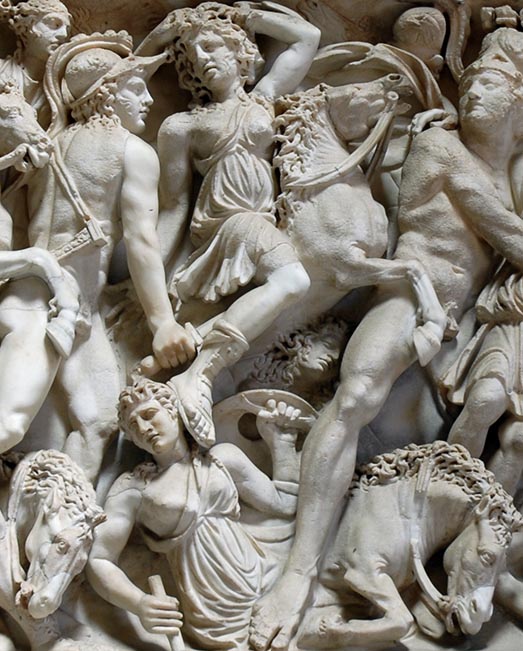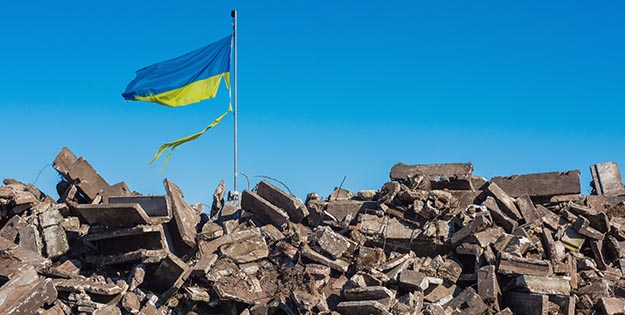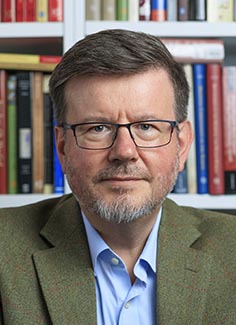Global
Copyright@ Australian Catholic University 1998-2026 | ABN 15 050 192 660 CRICOS registered provider: 00004G | PRV12008
Copyright@ Australian Catholic University 1998-2026 | ABN 15 050 192 660 CRICOS registered provider: 00004G | PRV12008

Some years ago, in Rome, a teenager named Darius von Güttner-Sporzyński developed an interest in the study of Central European history. The young Darius was fascinated with the continent’s deep, rich past.
With the guidance of an aunt who was conducting research to write her own history, he tagged along and learned about different forms of historical sources, prompting him to teach himself Latin and Russian scripts to further feed his thirst for knowledge.
“It was a teenage fascination,” recalls Professor von Güttner, Dean of ACU’s Canberra Campus and Research Associate at the Gender and Women’s History Research Centre. “I was in the Eternal City … I mean, is there a better place to start exploring?”
One of the questions that interested him was: How did the idea of being European emerge?
“I wondered how it was possible that those people from the very west of Europe – Spain, Portugal, Gibraltar – they claim that they’re Europeans, and at the same time, the people from the north – Norway, Iceland – they claim to be Europeans, while the people down south – Malta, Italy, Greece – they also say they’re Europeans, as do people living as far as the Arctic Circle, past the Muscovy,” he says.
“So this question of Europe and how it emerged led me to explore the transmission of ideas, and it’s a theme that I’ve been fascinated with ever since.”
By the time he arrived in Australia in his late teens, he was committed to pursuing a career in history, studying at the University of Melbourne and eventually completing his PhD thesis there. Decades later, Professor von Güttner is recognised as one of Australia’s most accomplished historians of East Central Europe, with myriad publications covering diverse aspects of history from the Middle Ages to the early modern and modern eras. But it was the time that he spent in Rome all those years ago that the journey of exploration began.
“It was the vision and the realisation that Europe was not just England, France, Spain and the western part of Germany,” he says, “but that people from places like Russia, Poland and Lithuania identify as Europeans, and how Christianity united the continent and made it Europe – I think that’s probably the first realisation of how fascinating I found history to be.”
As the author of many journal articles, chapters and books including the oft-cited Poland, Holy War, and the Piast Monarchy, Darius von Güttner-Sporzyński’s research has largely focused on the impact of religious conflict and crusading on Central European history.
“I’ve looked at the mechanism of how religiously-motivated violence has shaped a lot of behaviours on the European continent,” says Professor von Güttner, whose aforementioned book challenges the idea that Poland did not participate in sacred warfare because of their “aversion to the use of violence in the matters of faith”.
“I was interested in exploring how the crusades served as a vehicle that took Europe beyond the expanse of the Roman Empire. Why travel to parts of the world unknown in order to introduce the Christian religion there? My early research was essentially an attempt to answer that question, to explore the transmission of that idea.”
More recently, his interests have expanded to include other topics, including global history, and the performances of elite women like the key early modern figures Bona Sforza and Isabella d’Aragona.
At the same time, he has sought to reach a general audience through media articles and interviews, delving into topics such as Russia’s invasion of Ukraine to give the general public a deeper understanding of the historical context behind modern-day issues.
“I think it’s absolutely critical that historians engage in history that is easily accessible to others,” says Professor von Güttner, who appears on a weekly history segment on ABC Canberra every Thursday at 2.40pm.
“It’s crucial that we open conversations so that people who are curious or interested in history are able to ask questions and seek explanations to expand their knowledge of the past.”
One of his bugbears is the simplistic vision that many people have of Europe and European history. While it is often said that the history curriculum taught in Australian schools is Eurocentric, Professor von Güttner argues that it lacks the wider view of Europe as a global continent.

“I think that’s historically motivated, because English is the predominant language here and the English way of looking at Europe is conditioned by two very dominant narratives – it is seen either through German eyes or Russian eyes,” he says.
“The moment we have to move beyond that cultural setting, it’s uncomfortable. Having talked to history teachers that are actually in Australian classrooms, both they and their students crave more information, but we don’t know how to teach European history, and because of that, most Australians simply don’t understand Europe beyond a very narrow context.”
Having lived in regional Victoria for two decades before his recent move to Canberra, Professor von Güttner also has a strong interest in issues affecting education in regional and rural areas.
While the rapid growth of online learning in recent years has been heralded as a positive for regional students, he contends that the “tyranny of distance” has not yet been overcome.
“I think we need to ask ourselves: Is our new and emerging technology really serving regional communities and regional students? Because while you and I can talk right now online through Teams, which is absolutely brilliant, would this be pedagogically sound if we’re talking about education?” he asks.
“Online education can be excellent, but I would argue that it doesn’t suit everyone and in many cases just creates a different version of the ‘tyranny of distance’. We still see that regional communities are removed from the opportunities that our big metropolitan cities offer students, so we need to consider the issues affecting those communities and work together with them to find genuine solutions.”
As for his role as Dean of ACU’s Signadou Campus, he sees an opportunity to engage more closely with the Canberra community – both with its regional character, and its position as the nation’s capital.
“It’s about using our presence here as a channel of communication with the people of Canberra and all that is embraced here – the political side, the economic side, the research and innovation that occurs here,” says Professor von Güttner, who took up his role as Campus Dean in late 2022.
He also has a vision to emphasise the arts and humanities, highlighting the importance of these academic disciplines to our understanding of the past, present and future.
“I think the humanities are crucial to critical thinking and our ability to understand the world,” he says. “By encouraging an appreciation of the humanities, we ensure that we are not just educating our students to become workers or consumers; we are educating citizens who will be ready to make informed choices about the future of our nation.”
So, what do we gain from having a broader, more comprehensive view of the history of a certain part of the world? What relevance do the lives of historical figures like Isabella d’Aragona and Bona Sforza have to us here in the modern day?
Says Professor von Güttner: “They give us insight into how humans interacted in the past, how those women were perceived and how they themselves interacted with society around them, and that demonstrates to us that something that happened five-hundred years ago is not so remote to what is happening today.”
Exploring their legacy is important, he says, because it can inform discussions we are having on contemporary issues like gender equality and gender relations.
“These women who descended from the House of Aragon acted as daughters, sisters, mothers and widows in a specific way that challenged or circumvented the gender norms of the day,” says Professor von Güttner, who in early 2023 published the open access article, “Daughter, Mother, Widow: The Making of the Identities of Isabella d'Aragona”.
“They had the agency to act in their own right, and that demonstrates to us that the questions we ask about gender equality are questions that have been asked for a very long time, and that in some cases, women have been able to play a vital role even in challenging circumstances – I think the potential learnings from that are enormous.
“It brings us back to the fundamental point that if we have an awareness of our origins, we are better able to orient ourselves for the future. I’m not saying that history is the one essential thing we need to solve all of our problems, but there is absolutely no doubt that we can benefit greatly from an appreciation of our past.”
Professor Darius von Güttner-Sporzyński is a historian of East Central Europe with an interest in cultural aspects of transmission of ideas and identity. He is General Editor of the book series East Central Europe, 476-1795 published by Brepols.

His research has examined aspects of crusades and crusading in parts of Europe, gendered responses to performances of elite European women, among other topics. He appears on a weekly ABC radio segment on Afternoons with Georgia Stynes every Thursday at 2.40pm.
Passionate about history? Explore ACU’s courses.
Copyright@ Australian Catholic University 1998-2026 | ABN 15 050 192 660 CRICOS registered provider: 00004G | PRV12008